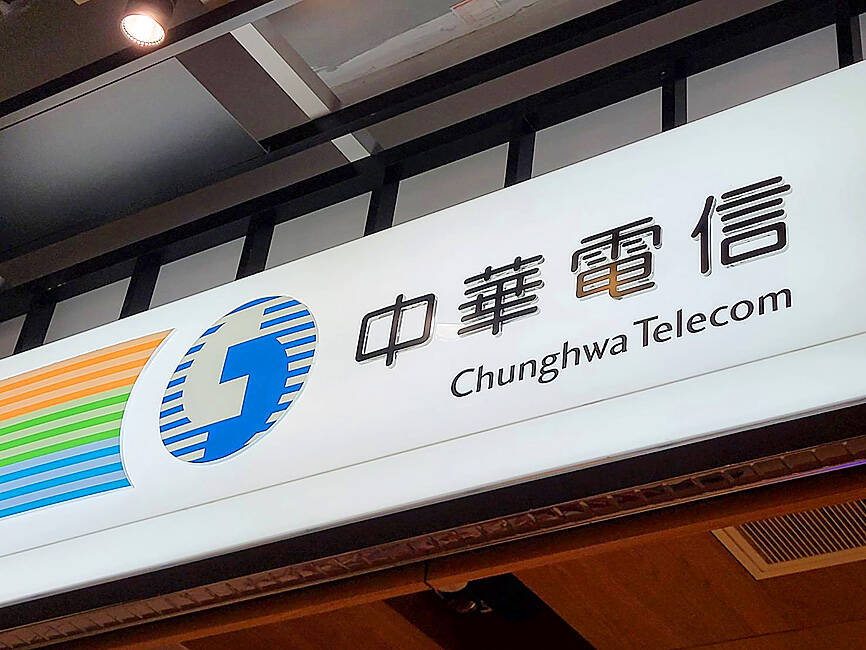Chunghwa Telecom Co (中華電信), the nation’s biggest telecom, yesterday said it plans to invest more than NT$4.6 billion (US$139.2 million) in a new trans-Pacific fiber-optic submarine cable with global partners, with an aim to boost network resilience and to cope with rising demand from artificial intelligence (AI) applications.
The telecom’s new investment came amid caution over submarine cable security after several cables linked to Taiwan have been sabotaged by foreign freighters or natural causes since the beginning of this year.
The new subsea cable network, dubbed E2A, is to be developed and invested by a consortium that comprises Chunghwa Telecom, SK Broadband Co, Softbank Corp and Verizon Business Global LLC, Chunghwa Telecom said in a statement.

Photo: CNA
The E2A, spanning 12,500km, would significantly enhance digital connectivity between Asia and North America, providing a robust backbone for AI applications, data centers and cloud services, ensuring high-speed connectivity across the Pacific Ocean as well as intra-Asia, the statement said.
The new submarine cable is scheduled to be ready for service in the second half of 2028, the statement said.
“Chunghwa Telecom will continue to enhance its resilient network infrastructure by integrating submarine cables, fiber optics, mobile communications, satellites and microwave technologies — forming a comprehensive ‘Sea, Land, Sky, and Space’ network,” Chunghwa Telecom chairman Alex Chien (簡志誠) said in the statement.
“Leveraging Taiwan’s strategic position as an Asia-Pacific information hub, we aim to attract international operators to establish a presence in Taiwan, further advancing AI-driven innovations and co-creation services to meet the evolving needs of our customers,” he said.
Crossing the Pacific Ocean, the E2A cable system would connect major digital hubs in Asia and North America, with landings in Yilan County’s Toucheng Township (頭城), South Korea’s Busan, Japan’s Chiba and Morro Bay in California, the statement said.
The cable would also connect with other upcoming cables in Taiwan, such as the SJC2 and Apricot, enabling diverse connectivity options, Chunghwa Telecom said.
This would strengthen Taiwan’s position as a key submarine cable hub in the Asia-Pacific region, it said.
It would further enhance the company’s overall network resilience, in addition to providing sufficient bandwidth to meet demand, it added.
The total cost of the submarine cable would be shared by all parties of the consortium, Chunghwa Telecom said.
The company has so far invested in more than 30 global submarine cables, with about 14 of them landing in Taiwan, it said.
The company has budgeted NT$32.36 billion for capital expenditure this year, up 12.3 percent from NT$28.82 billion last year.
Non-mobile capital expenditure is to increase 25.2 percent to NT$23.98 billion this year as Chunghwa Telecom aims to fund its investments in AI, data centers and new submarine cables, it added.

Right-wing political scientist Laura Fernandez on Sunday won Costa Rica’s presidential election by a landslide, after promising to crack down on rising violence linked to the cocaine trade. Fernandez’s nearest rival, economist Alvaro Ramos, conceded defeat as results showed the ruling party far exceeding the threshold of 40 percent needed to avoid a runoff. With 94 percent of polling stations counted, the political heir of outgoing Costa Rican President Rodrigo Chaves had captured 48.3 percent of the vote compared with Ramos’ 33.4 percent, the Supreme Electoral Tribunal said. As soon as the first results were announced, members of Fernandez’s Sovereign People’s Party

MORE RESPONSIBILITY: Draftees would be expected to fight alongside professional soldiers, likely requiring the transformation of some training brigades into combat units The armed forces are to start incorporating new conscripts into combined arms brigades this year to enhance combat readiness, the Executive Yuan’s latest policy report said. The new policy would affect Taiwanese men entering the military for their compulsory service, which was extended to one year under reforms by then-president Tsai Ing-wen (蔡英文) in 2022. The conscripts would be trained to operate machine guns, uncrewed aerial vehicles, anti-tank guided missile launchers and Stinger air defense systems, the report said, adding that the basic training would be lengthened to eight weeks. After basic training, conscripts would be sorted into infantry battalions that would take

GROWING AMBITIONS: The scale and tempo of the operations show that the Strait has become the core theater for China to expand its security interests, the report said Chinese military aircraft incursions around Taiwan have surged nearly 15-fold over the past five years, according to a report released yesterday by the Democratic Progressive Party’s (DPP) Department of China Affairs. Sorties in the Taiwan Strait were previously irregular, totaling 380 in 2020, but have since evolved into routine operations, the report showed. “This demonstrates that the Taiwan Strait has become both the starting point and testing ground for Beijing’s expansionist ambitions,” it said. Driven by military expansionism, China is systematically pursuing actions aimed at altering the regional “status quo,” the department said, adding that Taiwan represents the most critical link in China’s

‘REALLY PROUD’: Nvidia would not be possible without Taiwan, Huang said, adding that TSMC would be increasing its capacity by 100 percent Nvidia Corp CEO Jensen Huang (黃仁勳) on Saturday praised and lightly cajoled his major Taiwanese suppliers to produce more to help power strong demand for artificial intelligence (AI), capping a visit to the country of his birth, where he has been mobbed by adoring fans at every step. Speaking at an impromptu press conference in the rain outside a Taipei restaurant, where he had hosted suppliers for a “trillion-dollar dinner,” named after the market capitalization of those firms attending, Huang said this would be another good year for business. “TSMC needs to work very hard this year because I need a lot